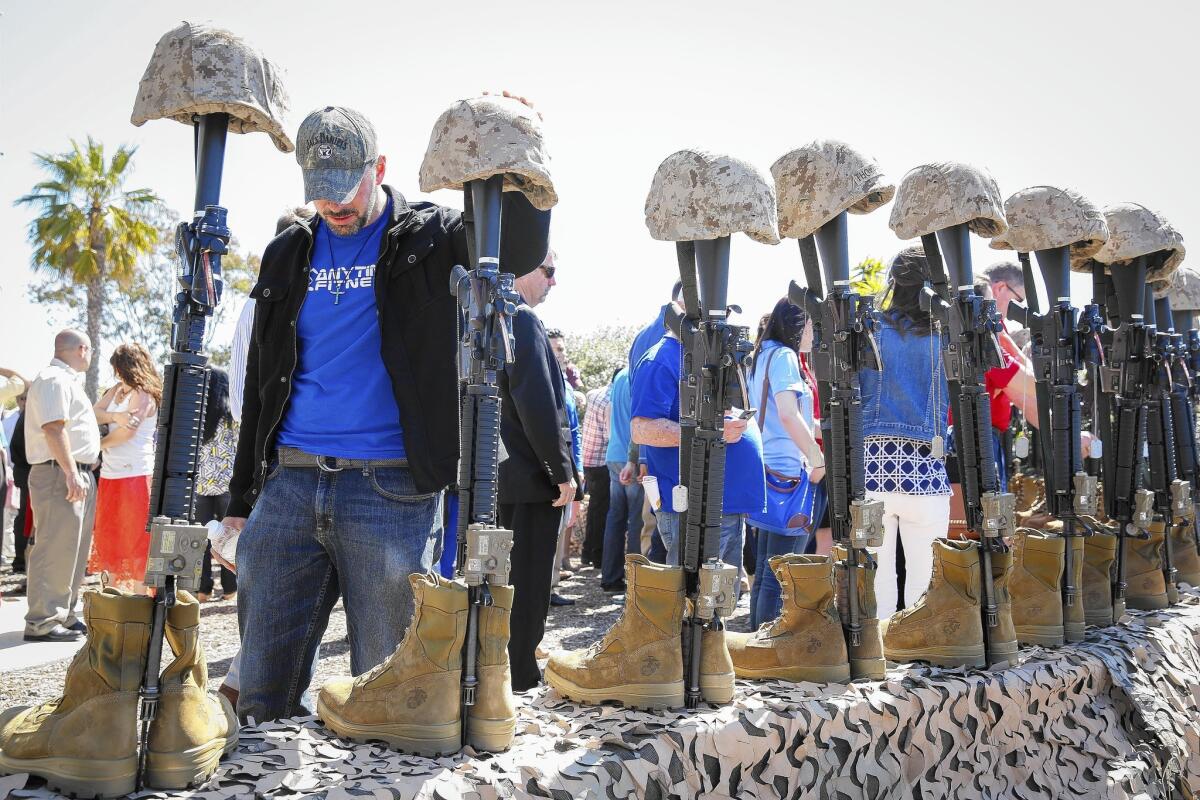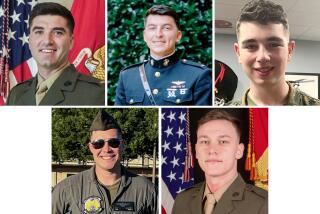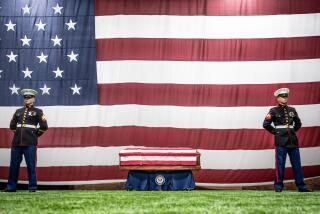Marines and family members mark 10th anniversary of Iraq war battle

- Share via
CAMP PENDLETON — To the outside world, the names mean nothing.
But to Marines who fought in Ramadi, Iraq, and to the families of the fallen, the names will forever be redolent of service and sacrifice: the Snakepit, Hurricane Point, Junction City, Blue Diamond, the government center and Charlie Med, the field hospital where dead and dying Marines were brought.
Several hundred Marines and family members gathered Sunday morning to mention the locations of outposts and firefights and to remember the Marines who fought and died in Ramadi, a battle that began 10 years ago Sunday.
Saddam Hussein had been deposed a year earlier, and the Marines of the 2nd Battalion, 4th Regiment had deployed to Ramadi, the capital of Anbar province, in March 2004.
The mission of the 2/4 was supposed to be “security and stability:’’ to aid in Iraq’s transition to democracy, maybe to start sports teams for the young and help in the construction of schools and health centers.
Instead, Ramadi soon “transformed to full-blown urban combat,” Lt. Col. Rob Weiler, who was with the 2/4 in 2004, told the gathering. “We fought alone but not afraid,” Weiler said, his voice breaking with emotion.
On April 6, 2004, the first day of fighting, 12 Marines were killed. By September of that year, 34 Marines and a Navy corpsman had been killed and 269 Marines had been wounded.
There would be further skirmishes in Ramadi in succeeding years but never again would the insurgents attempt an all-out assault. The Marines of the 2/4, a battalion known as the Magnificent Bastards, had done their job, Marine brass said.
“I walked the streets of Ramadi in 2006 without a flak jacket or helmet because of the work done by the Magnificent Bastards in 2004,” said Maj. Gen. Lawrence Nicholson, now commanding general of the 1st Marine Division.
No Marine battalion in the Iraq war suffered as many casualties as the 2/4 during that deployment, Nicholson said.
Among those at the ceremony were a former 2/4 Marine in a wheelchair, a former 2/4 Marine with a prosthetic arm and a former 2/4 Navy corpsman accompanied by his service dog, a tan Labrador-poodle mix.
Former 2/4 corpsman Mario Borrego, 42, said the dog, Sierra, helps him in overcoming physical injuries and the anxieties of post-traumatic stress disorder. “We go everywhere,” he said.
After the speeches, family members inspected the memorials to the fallen, the dog tags and inverted rifles. Former and active-duty Marines who served together gathered to talk about their shared experiences and remember the sound of constant gunfire.
“There was horror, but also joking and playing around,” said Greg Clemens, 35, who was a corporal, a gunner on a Humvee and now is in college studying psychology. “You did what you had to do to keep your sanity.”
Ten family members of Lance Cpl. Emilian Sanchez, who was 20 when he was killed, came from their tribal home in the Santa Ana Pueblo of New Mexico. Military service, particularly the Marine Corps, is a deep tradition with the tribe.
“We get by each day, it’s slow,” said Berna Sanchez, Emilian’s sister. “We know we will see him in the next world, but it is still hard. We miss him so.”
The final chapter of the fight for Ramadi has not been written. With the U.S. gone, insurgents are attempting to retake Ramadi and nearby Fallouja. Whether Iraqi forces will prevail is unclear.
“In your heart, you hope that the Marines’ fight was worth it,” said Joey Sanchez, 45, Emilian’s brother. “Maybe it won’t be today or tomorrow, but you hope that finally, someday, it will all turn out well.”
Dianne Layfield, 63, of Fremont, Calif., whose son, Lance Cpl. Travis Layfield, 19, was killed on the first day of fighting, was among those family members who had encouraged the Marine Corps to hold a commemoration on the 10th anniversary.
“The pain never goes away; I cry almost every day: a song or something will remind me of Travis,” she said. “I will never let them be forgotten.”
More to Read
Sign up for Essential California
The most important California stories and recommendations in your inbox every morning.
You may occasionally receive promotional content from the Los Angeles Times.













